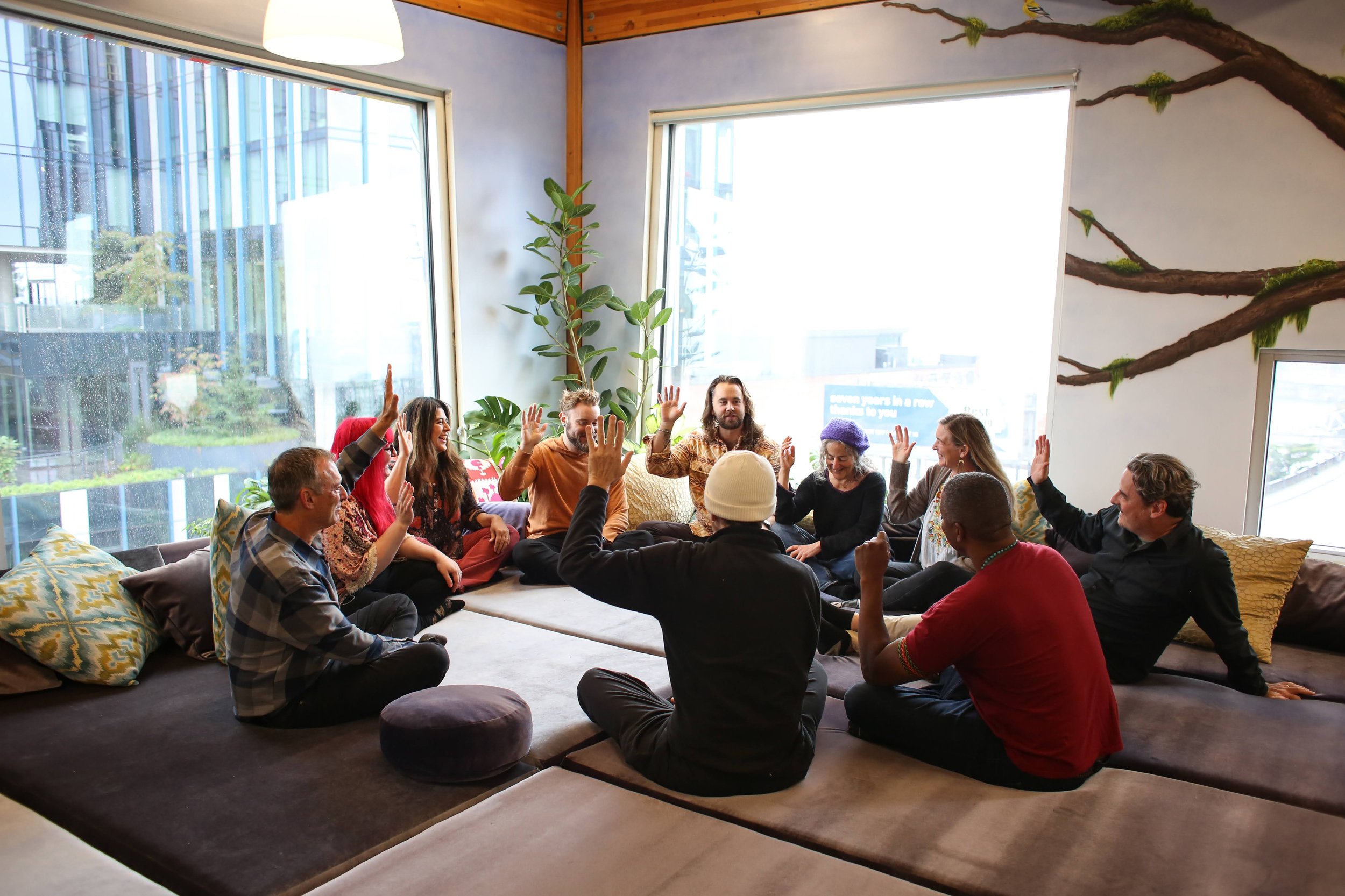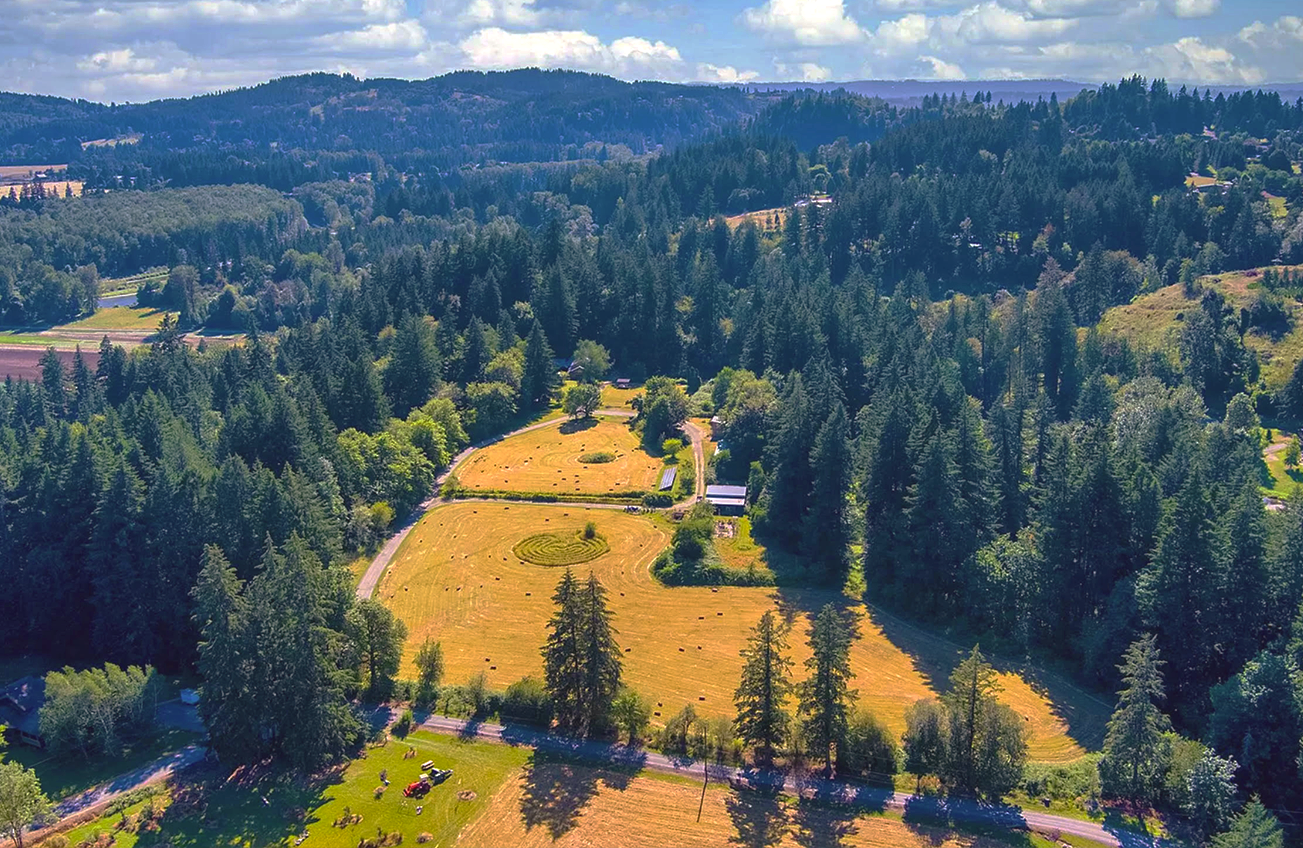InnerTrek Level 2:
Psychedelic Facilitator Training Program

InnerTrek’s groundbreaking training program prepares students to practice to the highest standards within the new paradigm of psychedelic care.
InnerTrek is approved by the Higher Education Coordinating Commission (HECC), Oregon Health Authority (OHA) and Colorado’s Department of Regulatory Agencies (DORA).
Graduates of InnerTrek’s Level 2 7-month training program are eligible for licensure in Oregon and Colorado and will be well-prepared for New Mexico’s 2027 program and future state models as they emerge.
Featured In
In-Person Program Details
InnerTrek was founded by the architect of the country’s first legal and publicly available psychedelic care model (passed by Oregon voters in 2020) and aims to spark healing and wholeness through the nation’s evolving legal psychedelic therapy ecosystem.
With 150+ hours of core didactic training and 40 hours of supervised practicum, the program meets and exceeds minimum state requirements in Oregon and Colorado. The course comprehensively covers the fundamentals of psilocybin care while also exploring the nuances of medicines such as MDMA, LSD, Ayahuasca, Ibogaine, DMT, and 5-MeO-DMT.
The curriculum is taught by a team of experienced practitioners, while guest presenters will provide specific expertise.
Didactic training occurs online and at in-person intensives near either Portland, Oregon or Denver, Colorado. We offer practicum experiences at InnerTrek’s Center for Psilocybin Services in Portland, Oregon.
Quality education and training is coupled with community. InnerTrek’s in-person training and practicum is paired with interactive online learning, supporting peer connections while preparing students to work within regulated service delivery models.
Core training includes:
7 in-person intensives
Online education within an immersive and interactive digital learning environment
Education in a variety of group sizes, including intimate “home groups”
Guest education and lectures from experts in the evolving field
Experiential “learning by doing” practicums with expert supervision and feedback
Virtual Pathway
For those who do not live near or otherwise cannot reasonably attend in-person training intensives, InnerTrek offers a virtual-only student path.
The virtual program is accessible globally through our live online classes and digital tools.
Graduates of the virtual program who elect to add on an in-person practicum are eligible for state-licensure in Oregon and Colorado.
Learn more about the Virtual Program here.
Eligibility:
Who can attend InnerTrek?
InnerTrek recognizes many paths to learning and skill-development. In alignment with state regulations, InnerTrek does not require a college degree and/or advanced education to be accepted into its psychedelic facilitator training program. InnerTrek does engage in a robust admissions process to ensure that accepted students have shown preparedness, goodness of fit, and a resolute commitment to the evolving field.
Clinicians, healthcare professionals and people with relevant experience are well positioned. Whether you are a physician, nurse, therapist, social worker, or alternative healer, InnerTrek delivers the education necessary to add psychedelic services to your current offerings.
You do not have to be a resident of Oregon or Colorado to enroll in InnerTrek’s Facilitator Training Program, or to become licensed in either state.
2025-2026 Program Dates
Our next Level 2 Facilitator Training Program will run during the 2026–2027 training year. Exact dates will be announced once enrollment is confirmed.
Practicum experiences will be scheduled near the end of core coursework and may extend slightly beyond the main training calendar.
We encourage early applications for priority consideration and to receive date announcements as soon as they are released.
Program Structure
Online Classes
(weekly)
All students will attend live 2 hour classes via Zoom Wednesdays from 5:30pm - 7:30 PST. These weekly classes are led by Lead Educators, Adjunct Educators and esteemed Guest Educators.
A special opening ceremony for virtual students will be hosted.
In-Person Intensives
(monthly)
Students will attend monthly full day “intensives” within cohorts of 20-36 students. Intensives, which include didactic training and experiential exercises, are offered in both Oregon (outside Portland) and Colorado (Denver) at beautiful nature-based retreat centers. Virtual students will receive videos and exercises from the intensives.
Home Groups
(bi-weekly)
Students attend 90 minute bi-weekly process-oriented “home groups” of 7 to 9 students on Zoom. Home groups are moderated by educators.
Practicum
(experiential)
Students will engage in two 20+ hour practicums to meet the 40 hour practicum requirements of Colorado and Oregon. We offer practicum locations near Denver and Portland, allowing students to attend in the location that suits them.
With supervision, students will experience and support psilocybin journeys in accordance with their education in the program and in alignment with the state regulated models.
A single 5 day, 40 hour practicum may be available depending on preference and need of enrolled students
Meet your Lead Instructors
-
Tal Sharabi is an experienced psychotherapist skilled in somatic and transpersonal models. Tal trained in psychedelic psychotherapy and research at the California Institute of Integral Studies, in Ketamine Assisted Psychotherapy through the Polaris Insight Center, and in MDMA-assisted therapy through her completion of Parts A-D of MAPS-Certified training. Tal is experienced in and enjoys designing and implementing therapeutic programs, mentoring new practitioners, and leading plant medicine retreats in different areas of the world.
-
Jason is a seasoned therapist in private practice in Seattle, where he incorporates a deeply humanistic and psychospiritual outlook, informed by a strong core of ethics. Jason has served as lead supervisor with the Zendo Project and has over 10 years of experience in psychedelic facilitation and education in a variety of capacities. He trained in Core Energetics and has a second degree black belt in Aikido.
-
Emma (she/they) is a somatic trauma therapist, a psychedelic-assisted therapist, and a psychedelic educator, organizer, and leader. Organizationally, Emma focuses on increasing ethics, trauma-informed care culture, and pro-liberation practices in organizations and psychedelic facilitation work. In their clinical work, Emma works at the intersection of trauma healing, queer identity development, and psychedelic healing. She co-founded the American Psychedelic Practitioners Association and teaches around the country at various institutions about consent and trauma-informed care practices in psychedelic services. Emma is a student of Celtic Druidry and strives to serve the medicine and her community with integrated mind, body, and spirit.
-
Christine is a legally licensed psilocybin facilitator in Colorado, certified through the Department of Regulatory Agencies (DORA). She has completed extensive training in psychedelic-assisted therapy with the Multidisciplinary Association for Psychedelic Studies (MAPS PBC) and in Holotropic Breathwork® facilitation. Christine’s approach is deeply rooted in trauma-informed, ethical, and relational principles, integrating contemporary medical and therapeutic standards to provide safe, compassionate psychedelic care.
Certified in the Emotional Response-Ability® framework, Christine supports clients in transforming challenging emotions into positive action, with a focus on stress reduction and emotional regulation. She is also the author of two children’s books on emotional intelligence, reflecting her heartfelt commitment to making healing and self-awareness accessible across generations.
Beyond her facilitation and coaching practice, Christine played a pivotal role on the MAPS PBC education team, managing both in-person and virtual training cohorts that expanded MDMA-assisted therapy education nationwide. This experience enhanced her expertise in curriculum design, cohort leadership, and community engagement.
Currently, Christine serves as Executive Director of the Harris Family Foundation, where she leads national initiatives advancing trauma healing for frontline workers, veterans, and first responders. Her facilitation style honors each individual’s inner healing intelligence and emphasizes compassion, collaboration, and shared responsibility for lasting transformation.

Curriculum
InnerTrek’s curriculum is competency-focused while weaving together a multi-faceted narrative.
InnerTrek’s program curriculum consists of 7 sections:
-
Students will be able to:
Describe the historical and current role of plant medicines in various wisdom traditions and identify key differences and shared principles across cultures
Demonstrate an understanding of the cultural impact of psychedelics in the West
Demonstrate an understanding of the basic pharmacology and neuroscience of psilocybin and other psychedelics
Understand key milestones in science and research relating to the ongoing development of psychedelic use as an adjunct to therapy over the last 65 years
Comprehend relevant ideas and theories relating to consciousness, personal transformation, and the psychedelic experience
Demonstrate a capacity and commitment to facilitate from an embodied, grounded, supportive presence
Develop core communication skills necessary to render psilocybin and psychedelic services in a participant-centered manner
Define problematic facilitator dispositions and interactions and explain how each can interfere with one’s work as a facilitator
Develop and practice flexible self-care systems that support the physical, mental, relational, spiritual, and emotional capacities necessary to do this work
Understand considerations when working with diverse populations
-
Students will be able to:
Develop skills to strengthen rapport and alliance with participants
Facilitate and review required intake forms with participants and conduct an effective information gathering intake interview
Conduct a preparation session that includes screening, applying scope of practice, safety planning, and appropriate expectation setting
Assess a participant’s readiness for psychedelic services and make final determinations regarding a participant’s goodness of fit
Orient a participant regarding what to expect from the service sequence and the psychedelic experience itself, while providing helpful advice
Understand and learn to establish a facilitator’s role, responsibilities, and authority with participants
Describe and discuss various dosing strategies and considerations
Evaluate participants with an understanding of drug and supplement interactions with psychedelics
-
Students will be able to:
Adapt facilitation practices to meet the needs of diverse populations
Understand the effects of psilocybin and other psychedelics on specific mental health populations
Convey the current findings of research into psychedelics in relation to specific client populations
Apply knowledge and skills attuned to the unique needs of persons with terminal illness
Apply knowledge and skill attuned to models of substance use, addiction, and recovery
-
Students will be able to:
Demonstrate an understanding of what is required to facilitate a smooth entry into a psychedelic experience
Demonstrate facilitation skills necessary to effectively facilitate a safe psychedelic experience
Demonstrate an understanding of skills, processes, and criteria involved in completing a psychedelic experience and session
“Hold space” for a variety of participant experiences
Work effectively with psychological distress and challenging behaviors
Implement protocols for responding to emergencies
Employ nondirective communication skills
Implement appropriate modes of intervention and know when not to intervene
Recognize and address adverse behavioral reactions and adverse medical reactions
Identify, describe, and internalize facilitator characteristics and skills related to effectively working with challenging experiences and behaviors during session
Identify and respond appropriately to forms of psychological distress common to the psychedelic experience
Identify and respond appropriately to difficult or challenging behaviors that can arise during a psychedelic session
Identify and work with repressed trauma rising to the surface of consciousness
Identify and respond appropriately to medical emergencies
-
Students will be able to:
Describe what integration is, the goals of the integration phase and its importance to healing, as well as communicate guidelines for an effective integration experience
Demonstrate skills that help participants integrate their psychedelic experiences into their daily lives
Understand various facilitator approaches and techniques relating to integration
Assess the impact of integration and when to recommend additional support
Identify safety concerns during integration
-
Students will be able to:
Apply skills to assess client compatibility with group format
Develop a group container and incorporate group considerations during intake process
Establish group agreements including confidentiality and safety
Demonstrate a capacity to orient participants effectively within a group-based orientation session
Understand and demonstrate essential skills involved in facilitating a small group ceremony
Demonstrate an understanding of how to conduct integration in a group format
-
Students will be able to:
Demonstrate an awareness of the important ethical issues related to being a psychedelic facilitator and a commitment to living / implementing core values
Demonstrate an understanding of the ethical dimensions around working across diverse social locations and cultures
Provide services with an awareness of racial justice and systemic inequity in the delivery of healthcare, mental healthcare, and behavioral health services
Develop a strategy to take responsibility for professional development, leadership presence, and impact on others
Demonstrate a detailed understanding of related laws, regulations, and professional standards as they pertain to the rights and ongoing professional obligations of licensed facilitators
Develop responsible referral and support systems
Develop a strategy for being an active agent of transformation, grounded in the emerging research of the field
InnerTrek Lead Educator Tal Sharabi
leading a Home Group.
Tuition
InnerTrek’s in-person program tuition is $10,900. This covers monthly intensives, weekly online classes, asynchronous learning, bi-weekly home group meetings, and practicum.
If accepted, a $1000 deposit, credited toward tuition, will hold your spot within the program. Students who attended level 1 and are accepted into level 2 can use their level 1 coursework as the deposit for level 2.
Students will have the opportunity to pay full tuition with a discount before the program begins, or pay the full amount in equal monthly installments over the course of the program. Payment plan options will be posted in 2026.
Students setting their intentions during the first day of InnerTrek’s program























